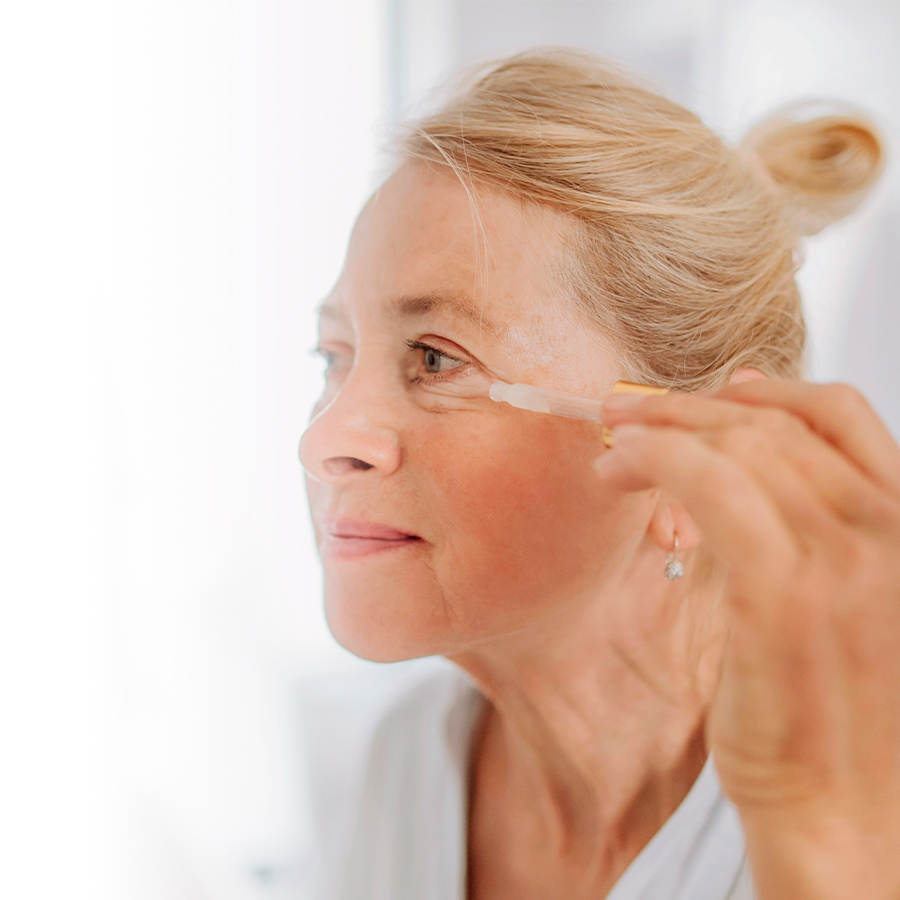It is a well-known fact that menopause causes many hormonal changes. Its symptoms extend far beyond the notorious hot flashes...
What is menopause?
By definition, menopause is the irreversible cessation of ovarian function. These organs, which play an essential role in reproduction, cease to produce eggs due to a decrease in hormones (estrogen and progesterone). Menopause signals the end of a woman's fertile period. Menstruation also ceases. The symptoms and effects of menopause are numerous and impact both the physical and well-being.
At what age does menopause begin?
Menopause usually sets in between the ages of 45 and 55, the average being 51. A woman is considered to have officially reached menopause 12 months after her last menstrual period.
What are the side effects of menopause on the body's health?
As women enter their forties, they notice a variety of body changes, some of which may be due to hormonal fluctuations. Here are the different symptoms of menopause that can be observed:
- weight gain;
- change in body shape;
- decreased muscle mass;
- fatty deposits in certain areas (stomach, thighs, buttocks, etc.);
- the skin becomes drier, thinner, and loses elasticity;
- changes in body hair;
- water retention (swelling).
Healthy lifestyle habits, daily care, preventive measures and certain medications can help limit the impact of menopause and enhance your well-being during this period of your life.
Up to what age can you have hot flashes?
Hot flashes can persist several years after menopause. On average, they last from 4 to 7 years, but some women experience them for up to 10 years. The duration depends on many factors: genetics, lifestyle, and the overall health of your body.
What are the effects of menopause on the skin and hair?
As hormones decrease, the skin becomes thinner, drier and less supple. Collagen production decreases, which accentuates the appearance of wrinkles and sagging skin. Hair can also become thinner, drier and less shiny.
Appropriate care, good hydration, a balanced diet, and a healthy lifestyle help to limit these effects.
Check out our article for tips on how to get your skin back on track during menopause.
What are the mental health symptoms of menopause?
Menopause is often accompanied by sleep disorders. Hormonal fluctuations can make it difficult to fall asleep or stay asleep, and sleep quality can be compromised. Sometimes, hot flashes and night sweats contribute to insomnia. All these difficulties can be a source of fatigue and irritability.
In addition, feeling depressed or experiencing mood swings are very common phenomena among women going through menopause or perimenopause (the phase preceding menopause). Furthermore, menopause increases the risk of depression, regardless of whether the woman has a history of depression. Common symptoms include sadness, fatigue or exhaustion, loss of interest in usual activities, and decreased or increased appetite.
What are the neurological and cognitive effects of menopause?
Some women also find that their mental faculties seem to be diminishing. For example, they may complain of frequent forgetfulness and that “feeling of having their head in the clouds.” Difficulty concentrating is also a common occurrence. These repercussions on daily life are, once again, the result of hormonal fluctuations.
Other factors besides hormones may also play a role here. Night-time hot flushes and sleep difficulties can lead to daytime fatigue affecting concentration. Let's not forget that memory and concentration problems are also typical symptoms of depression. So, it can be difficult to determine the exact causes.
Women with a history of migraines often notice that they intensify during the perimenopause. Some women find that their migraines greatly diminish or even disappear after menopause. Sometimes migraines continue to occur, or increase in frequency and intensity, according to a certain cycle linked to hormonal fluctuations.
How does menopause affect sexuality?
Many women find their intimate lives affected by the onset of menopause. Decreased libido is a common sexual problem that occurs in around 12% of postmenopausal women. Although libido, arousal, orgasm and satisfaction decline with age and menopause, rest assured: sexual satisfaction is still possible. Maintaining sexuality during menopause is entirely possible, here are the solutions available to you.
Vaginal atrophy is a very common genital disorder in menopausal women. This condition is characterized by thinning of the vaginal walls, vaginal dryness and a sensation of irritation or burning. These symptoms make intercourse uncomfortable or painful. An increased risk of vaginal or urinary tract infections is common.
Women experiencing sexual difficulties should discuss the issue with a health care professional because, fortunately, solutions exist.
What are the stages of menopause?
1 - Premenopause (or perimenopause)
Premenopause or perimenopause is the transition period to menopause. It manifests itself through menopausal symptoms such as irregular periods, hot flushes or irritability. This phase lasts an average of 4 to 7 years, and can be accompanied by concentration difficulties, joint pain and sleep problems. Medical follow-up and regular examination of symptoms help to manage this phase more effectively.
2 - Menopause
Menopause occurs when menstruation stops for at least 12 consecutive months. This is a natural step, but it can lead to health problems such as weight gain, urinary incontinence, or decreased muscle mass. In some cases, hormonal treatment (or hormone therapy) may be recommended by doctors to reduce certain symptoms.
3 - Postmenopause
Postmenopause is the period that follows. The body is now in a new hormonal balance, so it is important to increase efforts to prevent chronic diseases. There is an increased risk of coronary heart disease, stroke, blood clots and osteoporosis. Medical follow-up, regular physical activity, a balanced diet, and a healthy lifestyle contribute to maintaining a certain quality of life and well-being.
For more information on this subject, and on what you can do to help yourself through this transition period, talk to your pharmacist.




